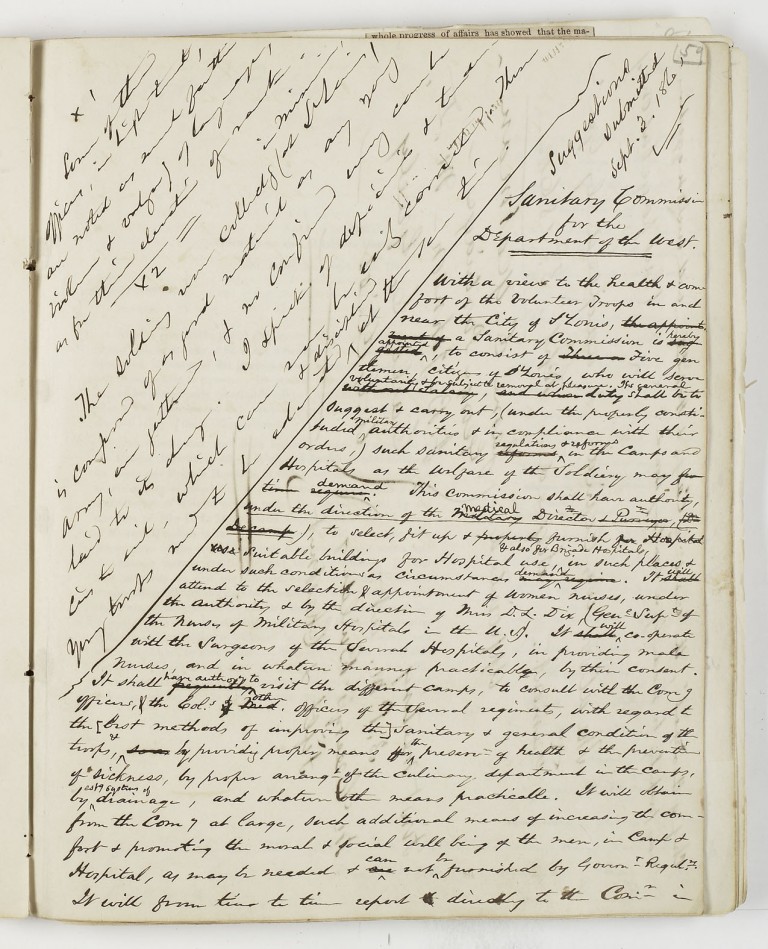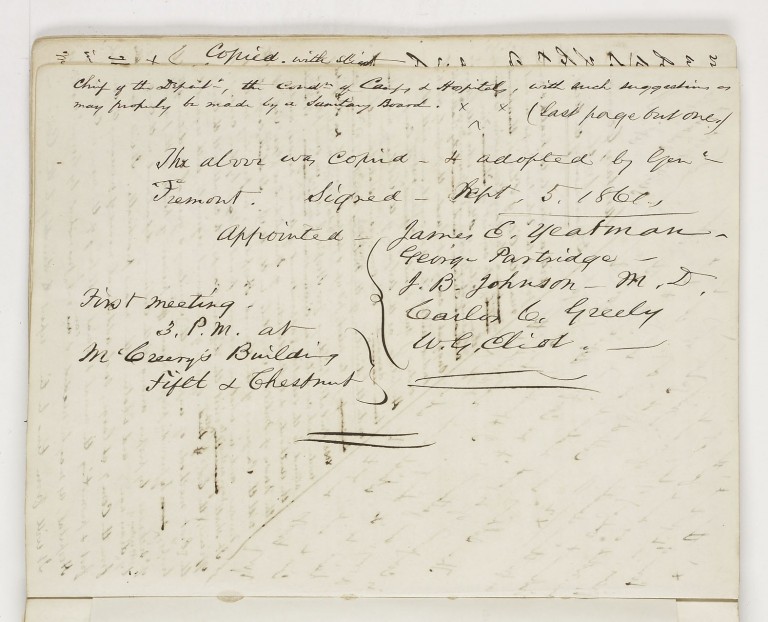The Independent Western Sanitary Commission: From the Desk of William Greenleaf Eliot
In June of 1861, the United States Congress created the U.S. Sanitary Commission, a government organization that would funnel funds and resources to army camps throughout the country, including Missouri. However, the Commission could not efficiently help camps near St. Louis, which remained in crisis. To counteract this dilemma, William Greenleaf Eliot and his friend James E. Yeatman began a campaign to instate a sanitary commission based in St. Louis to operate independent of, but parallel to, the official Commission. General John C. Frémont ratified their proposal in September, and the Western Sanitary Commission began operations days later.
This organization would work to establish new, clean hospitals and reform hygienic and moral conditions at army camps. It would help to regulate the different followers who amassed themselves near camps, including nurses tending the wounded. It would enlist nurses under the supervision of the general superintendent of the Nurses of Military Hospitals in the United States, Dorothea Dix. Incidentally, Dix had a reputation for having a rigorous selection process for her nurses: women had to be over thirty, not married, and plainly dressed. These strict measures reflect changing gender roles during the Civil War: if women were to enter the work force as nurses, they would have to appear more morally upright and modest than ordinary women.
The groundwork for the Commission was laid by the philanthropic group of elites to which Eliot belonged. Together, Eliot and his friends spearheaded local temperance movements, supported abolitionism, and encouraged school reform. Eliot’s motivations were also influenced by Unitarian theology: to raise the spirits of a congregation, one had to care for bodies and souls. As a private citizen in a fiercely factional city, Eliot could not individually treat those in need without risking violent retribution. Gaining some sort of official approval helped his cause, but he still had to go about his responsibilities for the Commission in secret. As he later stated in his journal, “Not one-fourth of the city’s wealthy and influential classes were loyal to the Union, one half of the cannon[s] planted on the forts for the defense of the city were pointed at the city, to keep in awe the enemies within.”
In all, the need for a Western Sanitary Commission speaks to the limited capacities of government agencies in western states during crises. With the U. S. Sanitary Commission all the way on the East Coast, there was no way to systematically funnel resources and funding to armies in the Mississippi Valley.
General Frémont approved the appeal, and the Commission was established within days. It proved an overall success: its members founded four hospitals in the area and improved St. Louis’s sewer system. After the Civil War, its influence stretched beyond Missouri, all the way to California. It continued to exist as a philanthropic agency until 1886.
Some of the officers, in [?] are noted as much for their violence & vulgarity of language as for their elevation of rank. X2 The soldiering man collecting ^in Missouri a salary is composed of as good material as any young army, even greater, & no confirmed every [?] laid to its day. I speak of deficiencies & t[?], which can be easily connected. These young troops need to be educated ^& disciplined at the same time. Suggestions submitted Sept. 3. 1861, Sanitary Commission for the Department of the West. With a view to the health & comfort of the Volunteer Troops in and near the City of St. Louis, the appointment of a Sanitary Commission is suggested ^hereby appointed to consist of Five gentlemen, citizens of St. Louis, who will serve without salary, and whose ^voluntarily & for subject to removal at pleasure. Its general duty shall be to suggest & carry out, (under the properly constituted ^military authorities & in compliance with their orders,) such sanitary reforms regulations & reforms in the Camps and Hospitals as the welfare of the Soldiery may from time request demand. This commission shall have authority, under the direction of the Military Medical Director & Purveyor Decamp) to select, fit up & property ^furnish for Hospital suitable buildings for Hospital use, ^& also for Brigade Hospitals, in such places & under such conditions as circumstances may require ^demand. It shall ^will | attend to the selection & appointment of women nurses, under the authority & by the direction of Miss. D.L. Dix, (Gen[era]l Sup[erintenden]t of the Nurses of Military Hospitals in the U.S.). It shall will co-operate with the Surgeons of the General Hospitals, in providing male nurses, and in whatever manner practicably, by their consent. It shall have authority to visit the different camps, to consult with the Com[mandin]g officers, the Colonels of Med. & other officers of the General regiments, with regard to the [best methods of improving the] sanitary & general condition of the troops, ^& so by providing proper means for ^the preserv[atio]n of health & the prevention of sickness, by proper man[a]g[emen]t of the culinary department in the camps, by ^estg? systems of drainage, and whatever other means practicable.
Series 01, Notebook 6, pages 59-60
To find out more about Eliot, please consult the William Greenleaf Eliot Personal Papers located at the University Archives and this library research guide. From the research guide you can link to more of Eliot’s online collection by perusing his materials at Missouri Digital Heritage, including more notebook pages.
Thank you to Miranda Rectenwald, archives assistant at Washington University Archives, for her help in writing this post.
Sources
- Rev. Dr. Earl K. Holt III, William Greenleaf Eliot: Conservative Radical;
- Miranda Rectenwald and Sonya Rooney, “‘Shall we be one strong united people…’” The Confluence, Spring/Summer 2011;
- James Neal Primm, Lion of the Valley: St. Louis, Missouri, Second Edition.


